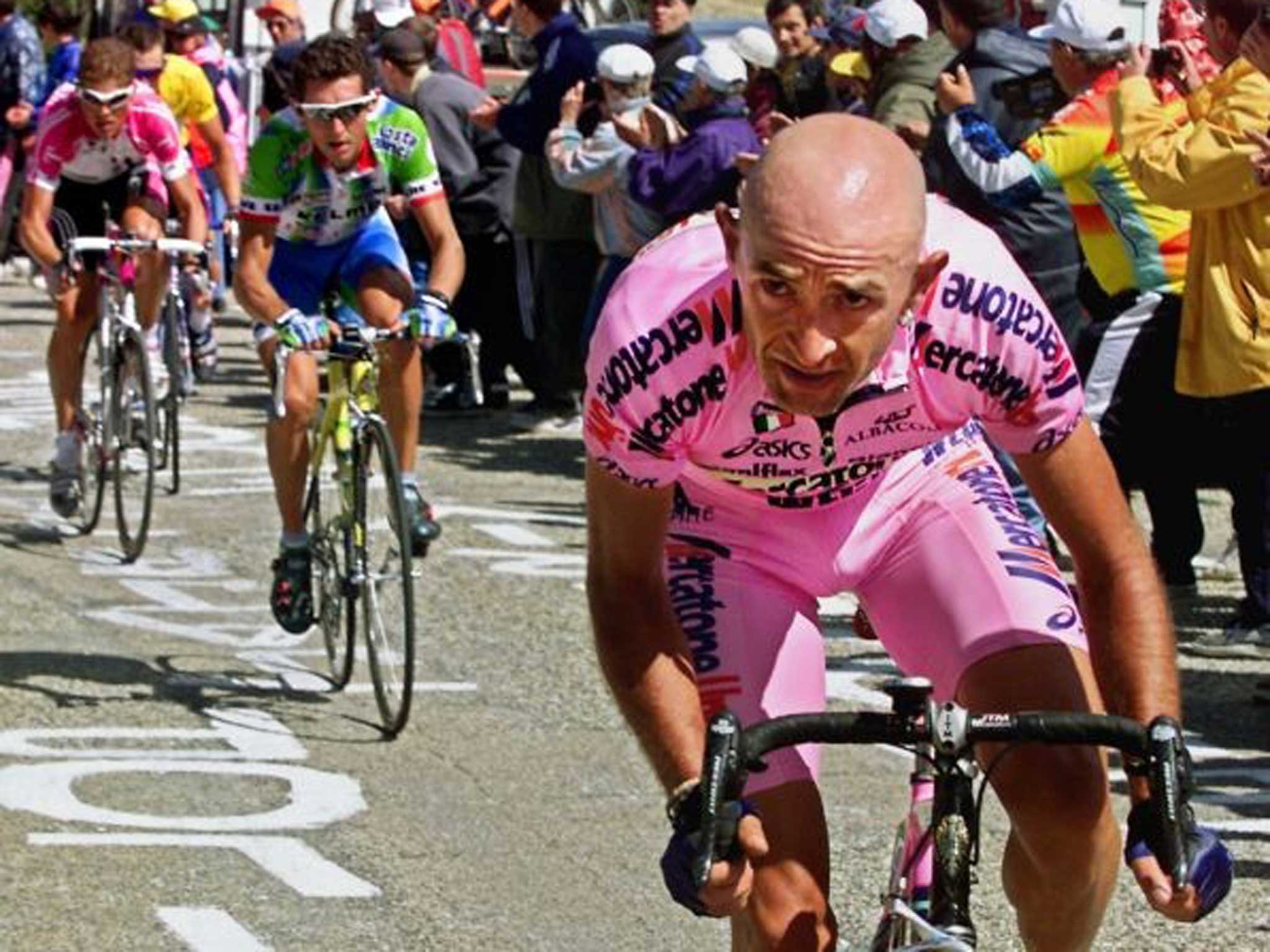The accidental death of a cyclist: As top riders prepare for the Giro d'Italia, a new film reveals the sad truth about race legend Marco Pantani

Your support helps us to tell the story
From reproductive rights to climate change to Big Tech, The Independent is on the ground when the story is developing. Whether it's investigating the financials of Elon Musk's pro-Trump PAC or producing our latest documentary, 'The A Word', which shines a light on the American women fighting for reproductive rights, we know how important it is to parse out the facts from the messaging.
At such a critical moment in US history, we need reporters on the ground. Your donation allows us to keep sending journalists to speak to both sides of the story.
The Independent is trusted by Americans across the entire political spectrum. And unlike many other quality news outlets, we choose not to lock Americans out of our reporting and analysis with paywalls. We believe quality journalism should be available to everyone, paid for by those who can afford it.
Your support makes all the difference.The cycling world gathers in Belfast this week for Saturday's guest staging of the Grande Partenza, the opening salvo of the Giro d'Italia. It is the first time since 1998, when Dublin waved off the Tour de France, that the sport's attention has been focused on Ireland, north or south, and it is a decade since the winner of that Tour, Marco Pantani, died in a hotel room in Rimini.
Pantani, the last to do the Tour and Giro double, was killed by a cocaine addiction that had gripped him with increasing firmness since the first swirl of speculation over his doping began following a blood test in 1999 conducted while he was in the process of humiliating his fellow riders in the Giro.
The tester arrived early one morning after Pantani had climbed to successive stage wins. The first came despite losing his chain and dropping to 126th out of 126 riders. His team were instructed he should not win the next. The Italian's utter dominance was bad for the sport, bad for the sponsors. The next day, riding up towards the Madonna di Campiglio, Pantani couldn't resist, couldn't help himself. He won. It was the beginning of his end.
Those close to him maintain there was a conspiracy to stop Pantani winning another Giro. Whatever it was there was no denying the outcome of the blood test – his red-blood cell level was above 50 per cent, a sure-fire indicator of EPO use.
James Erskine's engaging new film, Pantani: The Accidental Death of a Cyclist, traces the rise of the little boy from Cesenatico on the Adriatic coast whose grandfather chipped in to buy his first bike. "Mother nature had given Marco unique gifts," said one of his first coaches.
In 1992 he turned professional, but while he loved his sport – his first addiction – he did not love his vocation. He told his mother the professional game was "like the Mafia". He wanted out but was persuaded back into the fold. Did he already know what he would have to do to succeed?
It was at the 1994 Giro that Pantani sprang to wider attention, dropping the mighty Miguel Indurain during a stage at Valico di Santa Cristina. A nation fell for him. "A lot of cycling is about climbing mountains and he personified how it should look in this floating, angelic sense," said Bradley Wiggins, who has held a long fascination with the Giro. "I remember being in awe of this guy – the people's champion, this god that people worshipped. I almost felt not worthy to be in his company." Pantani's year of years was 1998. First he won the Giro, the key moment coming against Pavel Tonkov climbing up Monte Campioni. Pantani threw down his bandana and his nose stud as he pedalled upwards and away. "He heard his grandfather saying throw it all away," said his mother.
Two weeks later he departed Dublin in a Tour that descended into chaos. The Festina scandal – the crushing revelation that an entire team was systematically doping – clouded the sport, but many preferred to look beneath the clouds and instead see Pantani ascend the Col du Galibier and destroy Jan Ullrich.
Pantani's fall from grace was painful. After 1999 he returned and sparred with Lance Armstrong but the finger kept being pointed. Since his death, retroactive tests, not available during his career, on samples taken during the 1998 Tour tested positive for EPO.
The film features one of his final interviews. "I've been pressured, I've been humiliated," he said. "Today I don't associate cycling with winning. I associate it with terrible, terrible things that have happened to me and people close to me."
His family talk of the pressure he felt under to do as instructed by his team. This is no iron-willed Armstrong figure, rather a flawed man of immense talent, who, like many other riders, suffered in a dirty sport. "I don't think any of us could imagine what it would have been like then and the pressure he would have been under," said Wiggins. "If you were going to survive and if you wanted to win or make a living you had to do what you were told to do."
'Pantani: The Accidental Death of a Cyclist', (Soda Films), directed by James Erskine, is released on 16 May
Join our commenting forum
Join thought-provoking conversations, follow other Independent readers and see their replies
Comments